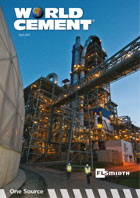Editorial comment
If you’ve been looking at our website lately – and I assume you have – you’ll have noticed the recent spate of stories coming out of Nigeria. It’s no secret that the Nigerian cement industry has been booming in recent years, led by Aliko Dangote’s Dangote Cement. In 2013, Nigeria became a cement exporter for the first time following huge capacity expansions across the country. Growth hasn’t eased yet, with reports this year of new cement plants, capacity expansions and significant investment in the sector – again, check our website for details.
Register for free »
Get started now for absolutely FREE, no credit card required.
The reason the industry has been making news over the last month or so, though, is a public outcry over cement standards. Poor quality cement is being blamed for building collapse, which is a relatively widespread problem in Nigeria. As recently as 1 March, I read a report of a three-storey building collapsing, trapping workers inside. Unfortunately, this was not an isolated incident, and a coalition of civil society groups and professional bodies has come forward to blame the cement industry and, specifically, the 32.5 grade cement.
At the time of writing, a technical committee has been convened to address the issue, led by the Standards Organisation of Nigeria (SON). The SON has defended the cement industry, whose products meet national standards. Both the cement industry and the SON have suggested that the problem is not the product itself, but the way it is being used. On the first day of the meeting, Dr Joseph Odumobo, Director General of SON, said: “When the whole controversy began, we embarked on a basic survey and administered [a] questionnaire to different people who are stakeholders in the building and construction industry, asking basic questions and the response revealed that the people did not actually know what they were buying from the market. When they get to the market they just ask for a cement and at best they ask for a particular brand name of cement.”*
Given the growth of the cement industry in Africa, we started a new LinkedIn group last month called ‘Cement Industry: Africa and the Middle East’. This question of cement quality and building collapse was one of the first group discussions. We asked whether the cement industry is responsible for the way the product is used. One respondent pointed out that you could ask the same question of the pharmaceutical industry in relation to misuse of their product. All agreed a good solution was to make sure bags are properly labelled to help end users make the right choices. Several companies are also involved in training block makers in Nigeria to improve construction standards. Dangote has upgraded its plants to produce 52.5 grade cement. How do you think the industry should respond to the issue of building collapse? Join the discussion on LinkedIn now and keep up with the latest news at www.worldcement.com.
* http://www.thisdaylive.com/articles/son-boss-blames-building-collapse-on-misapplication-of-cement/171999/


